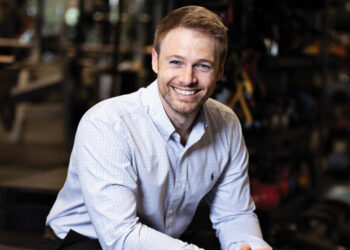The top lessons Steve and Sally Goldman have gleaned from 33 years of successful ownership at Weymouth Club in Weymouth, Massachusetts.
Sometimes, you just need to roll up your sleeves and get to work.
No duo understands this better than Steve and Sally Goldman, the co-owners of Weymouth Club in Weymouth, Massachusetts. Over the past 33 years, the husband-and-wife team have navigated two national crises — including the 2008 recession and the current COVID-19 pandemic — and overcome the natural struggles that come with owning a business in an ever-evolving industry.
The Goldmans purchased the then Weymouth Tennis Club in 1988. At the time, strength training and group exercise were growing in popularity among consumers, so the couple recognized the need to expand beyond racquet sports. Soon after purchasing the facility, they added a fitness center and group exercise studio, and became the first multipurpose health club on the South Shore of the greater Boston area.
From there, the Goldmans have continued to reinvest in the business and expand offerings, completing 17 renovations since purchasing the club. These renovations have seen Weymouth Club add childcare, indoor and outdoor pools, more tennis courts, Group X and cycling studios, and most recently, a mind-body center and recovery zone.
Today, the Goldmans take pride in Weymouth Club being a multipurpose health club where people of all ages — from babies to seniors — can move, learn and grow in the spirit of good health while fostering life skills.

So, after more than 30 years in business, what have been the biggest learning lessons for the Goldmans? And what have they gleaned from their most recent challenge, the COVID-19 pandemic?
The first lesson, according to Steve, is the importance of preparing for a crisis before it even begins.
“Every mentor has said, ‘Whenever you think things are going well, just get ready for that bombshell,’” explained Steve. “Sure enough, it always happens, no matter what part of life you’re in. We’ve kept that in the back of our minds through our whole lives in our marriage, and the same with the business.”
“You can’t be over leveraged,” echoed Sally. “We’re incredibly conservative people with our dollars. We do reinvest back into the club, but we have the money to reinvest back into the club within the context of our whole financial plan. If we were too much the other way, we wouldn’t be in business to be honest with you.”
A key component of being financially conservative in preparation for the inevitable rainy days involves empowering staff with knowledge of the key financials of the business — something Steve and Sally say many club operators either don’t do well or frequently.
At Weymouth Club, this involves holding monthly and bi-weekly meetings with department heads and key leadership on budget, goals and progress.
“It’s really important to have a scorecard,” said Sally. “We share a lot of financial information with our staff.”
According to Steve, this leads to more buy-in from staff on important decisions, and makes things easier when tough calls must be made. This was exemplified during the club’s shutdown in March 2020 as a result of the pandemic.
“When we had to make tough calls, everybody agreed — there wasn’t a hesitation,” said Steve. “When people realize we’re not hitting the numbers — because they know what the numbers need to be — they understand. They’re willing then to say, ‘OK, we’ll do this or that, because we want to get back to this point.’ By sharing numbers constantly and not trying to hide anything from employees, the information we share with them really sets it up so they feel part of the business.”

As a result of this commitment to financial planning and staff empowerment, the Goldmans entered the recent pandemic in a secure financial position. Between that and a Paycheck Protection Program loan, Weymouth Club was able to make key investments that will positively impact the club’s future.
According to Jeff Linn, the executive director of Weymouth Club, this includes a $200,000 investment into air quality and surface cleanliness, including the HVAC system, which saw the brand incorporate AIRPHX and Viking Pure Solutions. In addition, they added a winterized outdoor fitness tent — something they needed prior to the pandemic — that will prove to be an asset for years to come.
“Our largest complaint pre-pandemic was the amount of training happening on our fitness floor,” explained Linn. “So putting up the outdoor fitness tent solved multiple problems. We now have a space for our trainers to go to. These things were great decisions that Steve and Sally made that are here to stay.”
Although the Goldmans were in a strong financial position going into the pandemic, Sally stressed things haven’t been easy, and they have a long road ahead. But being fiscally responsible and empowering staff on the front end has been key to navigating this uncertain time.
“We’re not out of this pandemic,” said Sally. “We got whacked, and we are scratching our way back. I think that’s important to say, because there’s plenty of clubs out there in the same position, whether they’re saying it or not. You’ve got to be up for the fight, and you’ve got to be up for it for the long term. Because that’s what it is.”

And it has been a fight. Like many clubs across the U.S., the challenges the pandemic has brought Weymouth Club have been unpredictable and many.
Through it all, Steve, Sally and the Weymouth Club team, have taken on the philosophy that’s brought them successfully through 33 years: Roll up your sleeves, and get to work.
A great example of this mentality took place prior to the club’s reopening after its initial mandated shutdown. During its closure, the club made the previously aforementioned investments in surface cleanliness, air quality and the outdoor tent, in addition to implementing stringent social distancing and safety protocols.
However, the team realized members’ visions of what the gym looked like pre-COVID would be hard to dispel.
The solution was Zoom “Town Halls,” which would give Weymouth Club the opportunity to get in the trenches with members — addressing their fears and concerns, and educating them as best as possible.
“We generally had about anywhere from 50 to 65 RSVPs,” said Linn. “And we’d have about 45 show. One of our most important goals was to get people to feel what it’s like back at the club. You have this vision of a pre-COVID club, and you’re fearful of walking into a pre-COVID club, but it’s not a pre-COVID club. We shared pictures and a quick video of a group exercise class showcasing masks and social distancing, and that had a big impact for people.”
For the Weymouth Club, member and staff safety was of the utmost importance during this time. One, because the ownership and staff truly care. And two, because perception is reality — something Linn said many operators learned quickly over the course of the pandemic.
“The main perception we wanted to keep was safety first,” said Linn. “You had to toe the line as to how your state was driving decisions and navigate your business the best way. You had to make sure your clients, members and community knew safety was of the utmost importance. That was something we felt we made the right decisions on in navigating, at times, very frustrating periods.”
On the other side of reopening, Steve and Sally are looking ahead toward future challenges they may need to overcome that require them to roll up their sleeves.

For example, what are important marketing messages that work to activate frozen and alumni memberships? How do you navigate payroll as the business rebuilds? What is the right virtual menu for the business? Finally, is the club properly positioned for the deconditioned market inquiring about membership and programming — a group that could be highly motivated?
The last question is a bright spot for Weymouth Club, as properly onboarding members — including the deconditioned market — has been a key focus and differentiator for the brand over the years.
Weymouth Club’s philosophy is members don’t join a club, they join people and programs.
“The first thing is really building that relationship right from the start,” said Linn. “We have a couple of products where the goal is to help members find their pathway. What is going to make it tick for them? There’s an incredible amount of people who join a club, spend the money to come in and then they don’t want to work with somebody because they’re nervous. You’ve got to get through that and get them going in the right direction.”
To help new members find their pathway, Weymouth Club’s membership team is highly focused on integrating new joins into a program or session with a fitness professional — whether it’s a complimentary consultation with a registered dietitian, a personal training session or the club’s fast track tennis program, which teaches the basics of the sport in just a few weeks. In fact, 55% of the club’s revenue comes from programming.
“Our membership team needs constant training and reminders to place new members into programs or complimentary things right away, to get somebody to start working with them,” said Linn. “That’s our biggest challenge. Because people can say, ‘Great, I’ve just signed up’ — but then get lost really quickly.”
According to Linn, the nutritional component of new member appointments is especially successful — and something that should be kept in mind for those looking to integrate the deconditioned market into their clubs.
“We all know nutrition is a critical missing ingredient to people’s success, including their mental success, to start to see some results and improvement,” said Linn. “If you’re not giving them the resources to manage their nutrition, that result could take a lot longer which gives you an opportunity to lose them.”
As Sally and Steve look toward the future, they are optimistic the lessons they’ve learned over the last 33 years will lead to a future of continued success.
“What you learn about Weymouth Club is it’s a unique family facility with a team that feels like family and really rolls up their sleeves when times get tough,” said Steve. “As owners we really respect and appreciate that, and financially don’t want to make things work for just ourselves, of course, but for the people we surround ourselves with.”
Stay ahead in the fitness industry with exclusive updates!
Rachel Zabonick-Chonko is the editor-in-chief of Club Solutions Magazine. She can be reached at rachel@peakemedia.com.












Weymouth Club is a fantastic facility! I enjoyed my time working with Steve, Sally and Jeff greatly. There really is no better place to learn the importance of open accounting, hiring with culture being the guiding light and you can not find a better team of associates that care for each other and the members. Great job all continue the good work and be an inspiration to the rest of us.